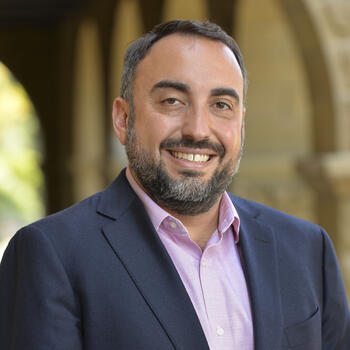Understanding 'Putin's Playbook'
To thwart the effects of ‘Putinism,’ the American people must first understand the nature of the threat, Michael McFaul told the House Intelligence Committee.
What is “Putinism,” and what threat does it pose to U.S. national security? What steps can the U.S. take to confront it? These are the questions that former U.S. Ambassador to Russia and Freeman Spogli Institute (FSI) Director Michael McFaul sought to answer in his testimony before the House Intelligence Committee on March 28, 2019.
Sign up for the FSI newsletter to receive more stories like this directly to your email inbox.
The committee’s hearing, “Putin’s Playbook: The Kremlin’s Use of Oligarchs, Money and Intelligence in 2016 and Beyond,” focused on the complex web of political and economic forces within Russia, and how they are leveraged abroad to advance Putin’s foreign policy agenda.
Chaired by Representative Adam Schiff, the committee listened as McFaul emphasized the need for foreign policy decision making to be based on the latest data-based research and evidence.
“To contain and thwart the malicious effects of ‘Putinism,’ said McFaul, “the United States government and the American people must first understand the nature of the threat.”
There Goes the Neighborhood
Since Putin’s first term as president in 2000, McFaul explained, the Russian economy has experienced a radical redistribution of property rights, increasing public ownership at the expense of the private sector, and further weakening property protection laws. Strengthened state ownership to support political aims has entrenched Putin’s leadership over the country but not fostered vibrant or sustainable economic growth.
Now You See it, Now You Don’t
To distract from domestic corruption, economic inefficiency and overall inequality, said McFaul, the Kremlin has drawn the public’s attention toward its foreign adversaries, particularly the United States. A fabricated narrative claims that sanctions are a foreign ploy to cause economic stagnation, rather than a diplomatic response to Russian violations of international law.
Putinism On The Move
According to McFaul, Putin leverages several powerful methods of influence, many of which parallel those used within Russia, to further disrupt and weaken the international order:
- Heavy investment in international media, such as RT and Sputnik International
- The creation of organizations, fake identities and bots to influence public opinion on non-Russian social media platforms, particularly in the West
- “Doxing” — the theft of information by digital means with the aim of weakening perceived adversaries
- The cultivation of direct contacts and financial support with sympathetic non-governmental organizations and individual politicians
- Strategic business engagements with foreign entities to establish political influence and leverage
- Mobilization of coercive actors, such as soldiers, mercenaries and even assassins
Although lifting sanctions is a high priority for the Kremlin, noted McFaul, Putin has sought to develop relationships with sympathetic figures in foreign governments and wait for a favorable change in power rather than addressing the primary reasons that sanctions were enacted in the first place.
Defining the U.S. Response
In response to these so-called rules of ‘Putin’s Playbook,’ McFaul has already partnered with Congressman Ro Khanna and Alex Stamos, the Director of the Stanford Internet Observatory, to define and advocate for the specific actions that will protect the United States’ national security, beginning with reforms to deter doxing operations and enhance the cybersecurity of voting infrastructure.
“National security is not a partisan issue,” said McFaul in his testimony before the House Intelligence Committee. “When it comes to national security, if the Russians attack us, they’re not going to just attack the Republicans and leave the Democrats to the side… I want us to get back to the national security threats that threaten all of us together.”
Read Michael McFaul’s complete written testimony.







